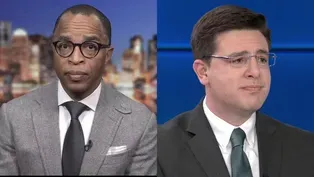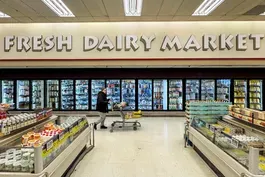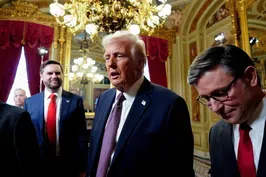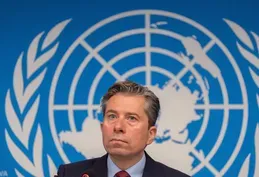
The growing concerns around the boom in sport betting
Clip: 2/7/2025 | 8m 31sVideo has Closed Captions
The growing concerns around the boom in sport betting
This Sunday in New Orleans, the Philadelphia Eagles will try to block the Kansas City Chiefs from taking home a historic third consecutive Super Bowl title. But there will also be a historic $1.4 billion riding on the game. Paul Solman reports on the snowballing and potentially perilous sports betting craze.
Major corporate funding for the PBS News Hour is provided by BDO, BNSF, Consumer Cellular, American Cruise Lines, and Raymond James. Funding for the PBS NewsHour Weekend is provided by...

The growing concerns around the boom in sport betting
Clip: 2/7/2025 | 8m 31sVideo has Closed Captions
This Sunday in New Orleans, the Philadelphia Eagles will try to block the Kansas City Chiefs from taking home a historic third consecutive Super Bowl title. But there will also be a historic $1.4 billion riding on the game. Paul Solman reports on the snowballing and potentially perilous sports betting craze.
How to Watch PBS News Hour
PBS News Hour is available to stream on pbs.org and the free PBS App, available on iPhone, Apple TV, Android TV, Android smartphones, Amazon Fire TV, Amazon Fire Tablet, Roku, Samsung Smart TV, and Vizio.
Providing Support for PBS.org
Learn Moreabout PBS online sponsorshipAMNA NAWAZ: This Sunday in New Orleans, the Philadelphia Eagles will try to block the Kansas City Chiefs from taking home an historic third consecutive Super Bowl title.
There will also be an historic amount of money riding on the game.
The American Gaming Association estimates that nearly $1.4 billion will be legally wagered, as Paul Solman reports, proof of a snowballing and potentially perilous sports betting craze.
ELI MANNING, Former NFL Player: I'm doing the FanDuel Kick of Destiny 3 live Super Bowl Sunday.
PAUL SOLMAN: Super Bowl Sunday, our eyes and ears blitzed by calls to get in on the action.
KEVIN HART, Actor: Now, I know it's the Super Bowl and all, but everyone gets a free bet?
PAUL SOLMAN: Nearly seven years after the Supreme Court struck down the ban on commercial sports betting, 39 states and the District of Colombia have legalized it.
Last year, more than one in three Americans said they'd put money on a game at some point in their life, up from the year before, while the American Gaming Association estimates that commercial sports betting revenue reached more than $14 billion, up 28 percent from 2023.
ROB MINNICK, Former Gambler: And it's gotten to a point where, if you're not betting on sports, people are starting to question why you're watching the game.
PAUL SOLMAN: For 25-year-old Philadelphia resident Rob Minnick, the gambling gateway was fantasy sports played as a teenager.
The switch to sports betting, which he began on illegal and offshore sites before turning the legal age of 21, was all too easy.
ROB MINNICK: If I was going to hang out with my friends or a family event was going to be happening, the center focal point was a professional sport of some kind.
And so this idea that we could do what we were already doing, but now make money doing it, it was like way too good to be true.
And it was.
PAUL SOLMAN: Too good because fun with friends became six to eight hours a day of compulsive gambling.
ROB MINNICK: Gambling was my way of expressing myself to prove I was smart, to prove I could win, to prove that I was worthy.
And the money kind of reflected the scoreboard.
PAUL SOLMAN: After six years of betting, he joined Gamblers Anonymous, eventually kicking his habit two years ago, and now hosting a podcast "One Day At a Time: Gambling Awareness," talking to people like himself about their struggles.
MAN: I started sports gambling, which was really what was my biggest vice, when I was 19.
ROB MINNICK: I'm going to call this an epidemic of addiction that's heading towards the United States, if not already hitting the United States.
It's not because the doors opened up and you got access.
It's because the doors opened up and people started pulling you through those doors.
MAN: All right, boys, who are we betting on?
PAUL SOLMAN: With the ads and come-ons that now buffet us all.
Of course, gambling addiction is nothing new, but understanding how big the problem is difficult, as there's no comprehensive national data.
The National Council on Problem Gambling estimates about 2.5 million Americans meet the criteria for severe gambling problem, while another 2 percent to 3 percent have a mild or moderate problem.
And recent studies found that legal sports betting decreased household savings and investments, led to more bankruptcies and loan delinquencies, even contributed to a rise in domestic violence.
HARRY LEVANT, Northeastern University: I made my last bet on April 27, 2014, and on that same night, nearly took my own life.
PAUL SOLMAN: Former lawyer Harry Levant, disbarred for stealing some $2 million from client funds to fuel his gambling addiction.
Now a licensed counselor and advocate for reform, Levant testified before the Senate Judiciary Committee in December.
HARRY LEVANT: We have known for more than 12 years that gambling is an addictive product and gambling disorder is an addiction similar to heroin, opioids, tobacco, alcohol and cocaine.
PAUL SOLMAN: Levant's own struggles began well before the advent of widespread legal sports betting, and he acknowledges that states now receive a cut of gambling revenues to build roads, schools and even fund treatment, like the 1-800 gambler help lines tagging those ads you see everywhere.
And so: HARRY LEVANT: I'm sympathetic to the need of our elected officials to balance budgets, but what has happened here is, they have no recognition or very little recognition of the product the gambling industry and its sports and media partners have rolled out.
NARRATOR: This is you, and this is your powerful hunch.
PAUL SOLMAN: He's pointing to the boom in offerings since the ban was lifted.
NARRATOR: With FanDuel, it's easier than ever to... PAUL SOLMAN: Proposition bets, wagers on the first player to score a touchdown at the Super Bowl,the length of the national anthem there, whether Taylor Swift and Travis Kelce get engaged.
JAMIE FOXX, Actor: BetMGM has got all the sports betting in one place and it's live, baby.
PAUL SOLMAN: There's live betting, which turns every moment of every game into a betting opportunity, and with A.I.
constantly adjusting the odds.
NARRATOR: You have got the power to create your perfect parlay any way you want.
PAUL SOLMAN: And there are parlays, which string together multiple bets, giving winners potentially sky-high payouts, but stacking the deck hugely in favor of the house, a fact that is not advertised.
MAN: And we will take an 18 again.
MAN: Yes, yes.
MAN: We will get our money back.
PAUL SOLMAN: Finally, livestreaming on both legal and offshore sites, and featuring influencers like mega-rapper Drake... MAN: You want $20,000.
Congratulations, man.
PAUL SOLMAN: ... who is paid to play and lure in new players.
All the while, the sports books harvest data from users, gaining insight into how to keep customers coming back.
HARRY LEVANT: I'd like to say it this way.
When the first cave person invented the first wheel, there was some schmuck three caves down laying 3-1 the wheel wouldn't work.
Gambling has been around a very long time.
It's not going anywhere.
But this is a fundamentally new, different, defective and dangerous online product.
PAUL SOLMAN: Last year, Senator Richard Blumenthal and Representative Andrea Salinas, both Democrats, introduced the Gambling Recovery Investment and Treatment Act to fund treatment and also research.
Five states with some form of legal gambling currently offer no funding at all for the treatment, and in September Blumenthal joined Democratic representative Paul Tonko of New York to propose the SAFE Bet Act to limit TV ads, restrict the number and the type of bets, ban A.I.
use to track players habits and create micro-bets, among other things.
HARRY LEVANT: Every other addictive product, government regulates the advertising, promotion, distribution, and consumption.
PAUL SOLMAN: Sitting just behind Harry Levant at that Senate hearing in December was the American Gaming Association's Joe Maloney.
The AGA says federal regulation not only isn't necessary; it will actually make things.
JOE MALONEY, American Gaming Association: The advancements in technology are just going to continue to take place.
They're just not going to take place in the legal regulated market.
PAUL SOLMAN: This is the key to the legal industry's argument, that it's taking the action away from illegal gambling, with its loan sharks, kneecappers, and unregulated offshore markets that teenagers like Rob Minnick use.
So, for example, in 2022, in Texas and California, which haven't legalized sports betting, the AGA says players spent more than $600 million in the illegal markets.
JOE MALONEY: Where they're prey to deceptive consumer practices, where there's no promotion of responsibility whatsoever, and there's zero taxes being remitted back into the state for the purposes of providing accessible clinical support for those demonstrating problematic activity or any other priority that they might deem those monies to go to.
PAUL SOLMAN: The SAFE Bet act is expected to be reintroduced in this Congress, although both Rob Minnick and Harry Levant agree, the legal gambling genie is out of the bottle.
HARRY LEVANT: I encourage people to become more aware of what is happening and understand there are serious risks involved and become part of the conversation to bring public health reform, not to prevent people from enjoying gambling, but to prevent an industry and its partners from preying on the public.
And, with that, I wish people who are gambling on a Super Bowl for recreational reasons, I wish them well with their bets.
Enjoy the game.
I'm in Philadelphia right now.
I need to say, go, birds.
PAUL SOLMAN: For the uninitiated, those birds would be the Eagles.
And for you all and the "PBS News Hour," Paul Solman in Boston.
A Brief But Spectacular take on making each day opening day
Video has Closed Captions
Lawrence Chu's Brief But Spectacular take on treating each day like a grand opening (3m 50s)
Capehart and Continetti on Trump's executive power
Video has Closed Captions
Capehart and Continetti on Trump pushing the limits of executive power (10m 53s)
Chicago Fed president on the new jobs report and economy
Video has Closed Captions
Chicago Fed president on what the new jobs report says about the economy (6m 37s)
Congress struggles to keep up as Trump reshapes government
Video has Closed Captions
Courts and Congress struggle to keep up with Trump as he reshapes American government (8m 19s)
Displaced Gazans return to face uncertain future
Video has Closed Captions
Displaced Gazans return to face shattered homeland and uncertain future (3m 32s)
News Wrap: Heavy rains in California trigger landslides
Video has Closed Captions
News Wrap: Heavy rains in California trigger landslides (4m 59s)
Top UN humanitarian official on the situation in Gaza
Video has Closed Captions
Top UN humanitarian official describes the current situation in Gaza (5m 12s)
Providing Support for PBS.org
Learn Moreabout PBS online sponsorshipMajor corporate funding for the PBS News Hour is provided by BDO, BNSF, Consumer Cellular, American Cruise Lines, and Raymond James. Funding for the PBS NewsHour Weekend is provided by...



















